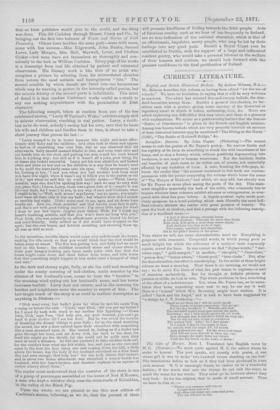Intaglios : Sonnets. By John Payne. (Pickering.)—The sonnet seems to
suit the genius of Mr. Payne's poetry. Its narrow limits and the rigidity of its form do something to ohook the wild luxurianoe of his. fancy, and to stop a fluency which, without positively degenerating into weakness, is not unapt to become wearisome. But the intrinsic faults. and beautioa of such verse as he writes aro, of course, not materially affected by any variation of form. A note, fronting the title-page, in- forms the reader that "the sonnets contained in this book are contem- poraneous with the poems comprising the volume which bears the name Of "The Masque of Shadows," and which, we may add, has already won for Mr. Payne no moan place among the poets of the day. This state- ment simplifies materially the task of the critic, who commonly has to inquire whether later volumes exhibit advance or retrogression, as com- pared with what has gone before. A. highly poetical style, made posi- tively gorgeous by a word-painting which uses liberally the most bril- liant colours, attracts the reader with groat promise of beauty. Wo open the book at random, and Lind a passage with the following descrip- tion of a woodland scone :-
" A hall of silver silence, wherein burns A soft star-glamour. Through the moss that binds Fern roots with gold, a slow clear water winds Aud slackens into tiny pools of light, Pale topazo, amethyst, and chrysolite, Set in the gilded tracery of the grass."
Turn where we will, the same characteristics moot us. Everything is gorgeous with ornament. Compound words, in which young poets so much delight, but which the soberness of a mature]: taste commonly rejects, crowd the linos. In one sonnet we find " thyme-scents," " nar- cissus-cups," " gold-marged ; " in another, " sun-gold," " Juno-clear," "poison-dew," "honey-sweet," "forest-pool," "tree-shade." But, after the first attraction, the effect is unsatisfying. In the midst of those bright colours we want a meaning. That there is no moaning, we would not say ; we do catch dim hints of what the poet wants to express,—a sort of sensuous melancholy. But for thought or definite pictures of passion or of life, wo look in vain. The whole produces, in fact, something of the effect of a kaleidoscope. Yet, when Mr. Payne has, as he some- times does have, something more real to say, he can say it well.. Hero is a "sonnet" which Mrs. Browning might have written. It is called "Jacob and the Angel," and is said to have been suggested by "a design by J. T. Nettloship :"—
" Shall ho not bless me ? will he never speak Those words of proud concession, 'Let me go: For the day breaketh ' ? Wearily and slow The shrouded hours troop past actress the peak, Eastering; and I with hands grown all too weak, And strength that would have failed mo long ago, But for the set soul, strain to overthrow The Instant God. Alas ! 'tie I that speak I Not Jacob, I that in this night of days Do wrestle with the angel Art, till health And gladness fail me! Yet the stern soul stays. And will not loose him till he bless me,—ay Even though the night defer my victory Until the day break on the dawn of death."






























 Previous page
Previous page